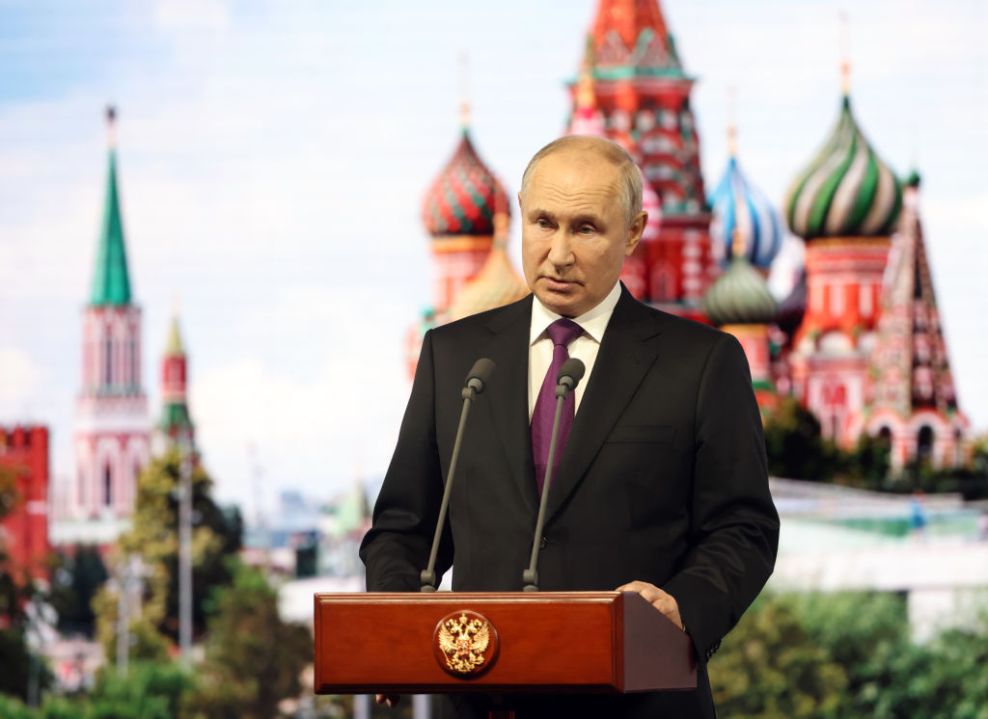The slow-grinding Ukrainian offensive in the country’s south has forced many to accept that the war against Russia might turn out to be a prolonged conflict. But while military experts debate whether or not Ukraine can win this war, and how such a victory could be achieved, the focus on military hardware and territory has skewed the West’s approach to the war and potential solutions. Russia’s war against Ukraine war is not a territorial conflict: it is an identity war aimed at extermination. It will not and cannot be solved by territorial changes or security compromises. Just listen to Putin and take him seriously.
This week, the Russian President sent a message that was extraordinary even by the standards of Russia’s unrestrained wartime propaganda. Speaking to a Kremlin advisory group, Putin declared that 1.5 million Jews, a quarter of all Holocaust victims, were killed by Ukrainian ‘nationalists and anti-Semites’ and that even the Nazis ‘didn’t consider it possible to take part in these mass repressions.’ After that meeting, Putin also told Russian propagandist Pavel Zarubin that ‘western handlers’ deliberately installed an ethnic Jew Volodymyr Zelensky as Ukraine’s president to conceal the country’s ‘anti-human nature.’
It might be tempting to dismiss these statements as conspiratorial lunacy or historical ignorance of an ageing and desperate dictator. It would be wrong. These are not gaffes but prepared, deliberate statements, a message that signals how Putin sees Ukraine and the war. This message is bleak. Putin is not after territory or security. His goal is to destroy Ukraine as a state – and in his vision, there can be no room for compromise.
Putin’s obsession with history and Ukraine go hand in hand. His July 2021 article ‘On the Historical Unity of Russians and Ukrainians’ outlined the Russian president’s conviction that Russians and Ukrainians are a single people that were divided by the machinations of foreign powers and that Ukraine is an artificial state. Ukraine, for the Kremlin, was an explicitly ‘anti-Russia’ project concocted by the West.
Putin’s belief in Ukraine being an artificial state has not changed, but the rhetoric is more ominous now.
If in 2021 and the earlier stages of the war Ukraine was ‘anti-Russia’, it is now ‘anti-human’. This shift is important. De-humanisation and genocide go together. Before now, genocidal rhetoric in Russia was previously restricted to propagandists and second-tier officials such as the former president Dmitry Medvedev. Now it comes from a person who can order a nuclear strike and had already positioned Ukraine outside of the shared obligations and norms of humanity.
No less ominous are Putin’s claims about the history of the Holocaust. The participation of Ukrainian nationalists and Nazi collaborators in the murder of the Jews in pogroms, as members of Nazi-organised auxiliary police units and as the Ukrainian Insurgent Army (UPA), is well documented. Yet blaming all Jewish victims in Ukraine on the Ukrainians and whitewashing the SS not only distorts the history of the Holocaust, but also reinforces the link that already exists in Putin’s mind between Ukrainian nationalism and Nazism, concealed by the Jewish president sock-puppet and his western masters. These perceptions go beyond Putin’s mind. A new Russian high school history textbook presents the idea of Ukraine’s independence as ‘unthinkable’ and ‘civilisation-ending’ and suggests that Cold War-era popular uprisings in communist dictatorships were CIA plots.
The implications of these beliefs are far-reaching. In Putin’s message there is no place for Nato expansion, security concerns or threats to Russia’s interests as justification for the invasion. Even if such factors did impact Putin’s earlier behaviour, they are no longer relevant. This is now a war of identity, in which no compromises are possible because you cannot compromise with an ‘anti-human’.
The Ukraine that exists in Putin’s worldview cannot be reformed or made human again; it ought to be destroyed so that ‘even the ashes’ – as Dmitry Medvedev put it – do not remain. It will be impossible for the Kremlin to reach an agreement with those it perceives as worse than Nazis, or their ‘foreign handlers’.
Those seeking to end this war need to grasp this reality. Freezing the conflict, a ceasefire, territorial compromise, security guarantees or even Nato membership for Ukraine will do little to change perceptions in Russia. And this problem will only get worse as more and more Russians are educated with a distorted history that dehumanises Ukraine and denies its right to exist. The West and Ukraine must realise that the war is not going away even if the shooting stops.
We cannot change Russian perceptions and beliefs but we can fortify ours. If the goal of Putin’s aggression is denial of Ukraine’s identity and statehood then this is what our focus should be on. Not just weapons but recognition and knowledge of the Ukrainian language, and the country’s distinct culture, traditions, and history, both good and painful. Without making Ukraine’s identity unquestionable and secure, we might help Ukraine win the war, but never have peace.







Comments